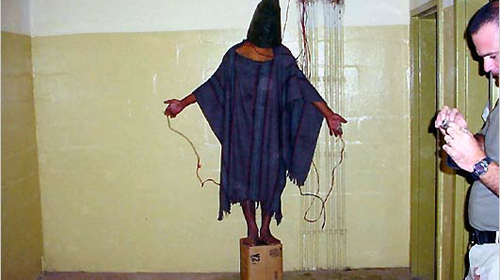In Torture Case Against Rumsfeld, Lawyers Cite “Widespread Pattern” of Abuse, Need for Accountability
FOR IMMEDIATE RELEASE
CONTACT: media@aclu.org
BLOG
Witness to Abuse: The ACLU Blogs on Guantánamo, including observations on the litigation over the past five years, first-hand accounts from the 2004 military commissions and hearings, and thoughts on the Hamdan v. Rumsfeld Supreme Court case.
Read the blog >>
NEWS RELEASE
> ACLU of Florida and Amnesty International Call on Congress to Restore Habeas, Close Guantánamo(1/11/2007)
MORE
> Blogs and Audio on Five Years in Guantánamo
WASHINGTON – The American Civil Liberties Union and Human Rights First today argued before a federal court that Secretary of Defense Donald Rumsfeld should be held accountable for the torture and abuse of detainees in U.S. military custody.
Today’s hearing marked the first time a federal court has considered whether top U.S. officials can be held legally accountable for the torture scandal in Iraq and Afghanistan.
“There must be legal accountability in a court of law for high-ranking government officials who order or allow torture in violation of the most fundamental legal norms that govern our society,” said ACLU attorney Lucas Guttentag, who is lead counsel in the case. “Torture is universally prohibited but Secretary Rumsfeld and the other defendants have not been held responsible for the orders they gave and the abuse they permitted.”
The ACLU and Human Rights First filed the lawsuit in March 2005 on behalf of nine innocent civilians who were detained by the United States military in Iraq and Afghanistan. While in U.S. custody, the men were subjected to abuse, torture and other cruel and degrading treatment, including severe and repeated beatings, cutting with knives, sexual humiliation and assault, mock executions, death threats, and restraint in contorted and excruciating positions. All of the men were released without charge.
“Our clients’ case is about ensuring that there’s meaningful accountability, to create an effective deterrent against future violations and to ensure the courts’ ongoing role in enforcing the law against torture,” said Deborah Pearlstein, director of Human Rights First’s Law and Security program. “The Supreme Court has made it clear that wartime does not create a law-free zone.”
The ACLU also brought three related lawsuits against Lt. General Ricardo Sanchez, former Brigadier General Janis Karpinski and Colonel Thomas Pappas. The four cases were consolidated and transferred to Chief Judge Thomas F. Hogan of the U.S. District Court for the District of Columbia. All of the defendants have moved to dismiss the suits in their entirety. The lawsuit is seeking compensatory damages for the plaintiffs and a court order declaring that the actions of Secretary Rumsfeld and the other officers violated the U.S. Constitution, federal statutes and international law.
Today’s hearing addressed the defendants’ claim that they cannot be held legally liable for the torture of civilians in U.S. custody. The ACLU and Human Rights First argued that the Constitution and international law clearly prohibit torture and require commanders to act when they know or should have known of abuses. In addition to the orders they gave directly, Secretary Rumsfeld and the other defendants were repeatedly notified of abuse and torture at detention facilities in Iraq and Afghanistan by military reports, the International Red Cross and other reports and complaints by human rights organizations.
The groups further charge in the lawsuit that Secretary Rumsfeld personally approved brutal and illegal interrogation techniques in December 2002. Those techniques included the use of “stress positions,” the removal of clothing, the use of dogs, and isolation and sensory deprivation.
Retired military officers and military legal experts have filed a legal brief in support of the lawsuit. According to the military law experts, “It was the essence of Secretary Rumsfeld and other defendants’ scope of employment to educate and train those within their command responsibility to adhere to domestic and international standards and to do everything within their power to prevent and punish deviations from them.” The experts urged that allowing the federal case to proceed would not intrude into matters of military decision-making, but would reinforce the military’s interest in command responsibility.
Additional attorneys in the case, Ali et al v. Rumsfeld, are Steven R. Shapiro, Cecillia Wang, Jennifer Chang, Monica Ramirez, Amrit Singh, Steven Watt and Omar Jadwat of the ACLU; Michael Posner, Hina Shamsi and Priti Patel of Human Rights First; Bill Lann Lee of Lieff Cabraser Heimann & Bernstein LLP; Paul Hoffman of Schonbrun DeSimone Seplow Harris & Hoffman LLP; Erwin Chemerinsky of Duke University School of Law; David Rudovsky of Kairys, Rudovsky, Epstein & Messing LLP; and Art Spitzer of the ACLU of the National Capital Area.
Legal briefs filed in the case, as well as information on the former detainees, are online at www.aclu.org/rumsfeld and www.humanrightsfirst.org/us_law/etn/lawsuit/index.asp.
Official government reports have documented many horrific abuses inflicted on detainees in U.S. custody. The ACLU and other advocacy groups have obtained more than 100,000 pages of documents concerning abuses through a Freedom of Information Act lawsuit, online at www.aclu.org/torturefoia. As these documents indicate, the FBI began to complain about the interrogation techniques used by the military on detainees in Guantánamo as early as 2002, techniques that spread to Afghanistan and Iraq. Media reports have also brought many disturbing incidents to light, including the deaths of detainees in custody.
Stay Informed
Every month, you'll receive regular roundups of the most important civil rights and civil liberties developments. Remember: a well-informed citizenry is the best defense against tyranny.



